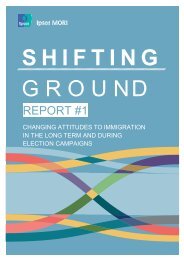You also want an ePaper? Increase the reach of your titles
YUMPU automatically turns print PDFs into web optimized ePapers that Google loves.
Ties <strong>that</strong> Bind<br />
321 http://web.archive.org/web/<br />
20080416025534/http://www.isl<br />
amonline.net/livedialogue/englis<br />
h/Browse.asp?hGuestID=cr7HxF<br />
322 http://www.anjemchoudary.<br />
com/press-releases/british-armyexposed-and-bradford-council-ofmosques-shamed<br />
323 Diversity In Modern Policing,<br />
(Demos and National Association<br />
of Muslim Police, 2008), p. 6<br />
72 | policyexchange.org.uk<br />
There is nothing wrong in defending one's country, but it is wrong for a country to transgress<br />
against others. Joining the British army for purposes other than defending the country against<br />
invasion or [for] aggressive attacks may be problematic for Muslims. 321<br />
Seddon’s view is based on the same essential model as Qaradawi’s earlier<br />
judgement. He affirms <strong>that</strong>, in principle, there is nothing to stop a young<br />
Muslim from joining the armed forces, followed by a series of caveats and<br />
moral dilemmas – which can be coupled with the idea of owing an overriding<br />
loyalty to the ummah.<br />
In <strong>that</strong> sense, the terms of all these rulings are rather vague and raise more<br />
questions than they answer. Seddon says <strong>that</strong> Muslims can join the armed forces<br />
if they wish to defend the UK, but not in the event of ‘aggressive attacks’. With<br />
this question being asked against the background of the Iraq War, the issue of<br />
whether a young Muslim should see Britain’s military campaign there as a<br />
defensive move is left unaddressed.<br />
This notion of incompatibility between the British armed forces and observant<br />
Islam is treated much less equivocally by Anjem Choudary, the founder of the<br />
now proscribed Islam4UK and organiser of their abortive Wootton Bassett march<br />
in January 2010. In a blog post from March 20<strong>11</strong>, the provocative and<br />
marginalised Choudary condemned the Bradford Council of Mosques for<br />
‘encouraging Muslims’ to join the British armed forces and asserted <strong>that</strong> ‘a<br />
Muslim will become an apostate if he fights for the British army against fellow<br />
Muslims’. 322<br />
Many Islamist leaders such as Qaradawi often argue <strong>that</strong> al-Qaeda represents<br />
an ‘aberration’ of Islamic theology. Yet, if <strong>that</strong> is their view, then why not<br />
encourage many more young Muslims to join the British forces to fight against<br />
it? After all, the notion of fighting against errant sects who undermine the<br />
Muslim faith – but claim to act in its name – is not unprecedented in Islamic<br />
history. Following the assassination of the third Caliph, Uthman ibn Affan, in<br />
656, a civil war known as ‘Fitnat Maqtal Uthmān’ – the fitnah (mischief) of the<br />
killing of Uthman – erupted when Muslim forces subdued different sects which<br />
they regarded as deviating from the faith. Why, then, are some Islamist scholars<br />
today so reluctant to encourage Muslim participation in actions which target<br />
movements such as al-Qaeda?<br />
The Police<br />
Islamists who suggest British Muslims should refuse to serve in the armed forces<br />
do not all limit their exclusionary message to military service alone. The same<br />
principle is often also applied to discourage those hoping to join the police force<br />
or the intelligence and security agencies. While neither of these could be said to<br />
be ‘at war’ with Muslims in the way the armed forces are, the idea <strong>that</strong> they are<br />
somehow weighted against Islam (and <strong>that</strong> a Muslim’s overriding loyal<strong>ties</strong> must<br />
always be to other Muslims) is again too often used to discourage them from<br />
joining. Like the armed forces, the number of Muslims in the police force fails to<br />
reflect their demographic presence. 323<br />
According to the banned group Islam4UK – one of the incarnations of Omar<br />
Bakri’s followers in Britain – Muslims who join the police force are guilty of<br />
apostasy. They insist <strong>that</strong> Muslims working for the police force are upholding and



